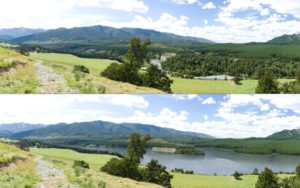The Supreme Court has denied an appeal to allow a land swap for the proposed Ruataniwha Dam project in the Hawke’s Bay.

The court’s decision was released today, following a Court of Appeal ruling last year that found the process of acquiring the land was unlawful.
The SMC asked environmental policy experts to comment on the decision. Feel free to use these comments in your reporting.
Associate Professor Christine Cheyne, Resource and Environmental Planning, Massey University, comments:
“The recent Supreme Court decision on the application to overturn the Court of Appeal by the Minister of Conservation and the Hawke’s Bay Regional Investment company, which seeks to develop a dam in the Ruahine Forest Park, reinforces the importance of the legislative framework for protection of New Zealand’s unique indigenous biodiversity.
“The suggestion from the Prime Minister that this framework needs to be altered is likely to draw strong public opposition. Changing laws as a work-around to achieve what could not be achieved in the Supreme Court appeal will be seen as particularly disingenuous. But, even more relevant, to change legislation would go against public opinion that recognises the need to protect our unique ecosystems and the services they provide.
“In recent years public opinion, as well as important economic interests, have provided significant momentum to address New Zealand’s degraded water bodies and over-allocation of water. Similar public concern is also building around New Zealand’s loss of indigenous biodiversity highlighted in recent reports this year such as the OECD 2017 report on New Zealand’s environmental performance and the Parliamentary Commissioner’s report on the parlous state of New Zealand’s native bird species.
“The risk that both degraded water and species loss poses to New Zealand’s tourism and export food sectors is mobilising key economic interests which highlight the short-term focus of current government policies. These policies encourage development that delivers only narrow short-term benefits and undermines the long-term benefits to the economy from conservation.
“The huge drawcard of our indigenous ecosystems and the landscapes in which they are found is central to the current surge in tourism. That’s why it makes so much sense to protect them. There are many options for water storage and restoration of water quality in the Tuki Tuki catchment. The decision to develop the RWSS [Ruataniwha Water Storage Scheme] was based on flawed assumptions about the acceptability of swapping Ruahine Forest Park land for less valuable land, which would establish a dangerous precedent for the rest of the conservation estate in New Zealand.
“An abysmal failure of advocacy for conservation by the Department of Conservation led to the Board of Inquiry’s original decision to approve the application to develop the Ruataniwha dam. After two further court cases the importance of conservation has been recognised.”
Dr Ann Brower, senior lecturer in environmental policy, Lincoln University, comments:
“This is certainly an important decision for the conservation of New Zealand’s unique landscapes and biodiversity. As chair of the NZ committee for the IUCN (International Union for the Conservation of Nature) and member of the World Commission on Protected Areas, I think that any other decision would have risked dire consequences for well-loved lands and threatened species.
“The Supreme Court has said that it’s not ok to ‘un-conserve’ public conservation land with identified ecological values just with the stroke of a pen by trading some land for other land. And un-conserving can take many forms – flooding, mining, road-building, grazing, cell-phone tower building.
“As chair of IUCN, I’d say this is a victory for conservation in the long run. It would be a brave government that legislates over the top of this decision.
“As a lecturer in environmental management, I’d say this will have consequences for the fairly common practice of biodiversity compensation and offsetting. We don’t have a clear policy guiding it, but it happens more and more – the practice of trading this habitat for that wetland restoration, or allowing degradation of this wetland in exchange for cash.
“The problem is that DOC rarely asks for this type of compensation, and then only cashes in on the compensation two-thirds of the time. So it’s not terrifically effective. This decision will require us to be much more careful about those types of exchanges, which is a good thing.
“And as a long-time researcher on high country tenure review, I’d say it’s a bit rich to limit DOC’s ability to trade 22 hectares while LINZ has been freeholding hundreds of thousands of hectares for 25 years. DOC was at least going to get some land in exchange. LINZ has somehow managed to lose over $60 million while selling more land than it got for the NZ taxpayer.”